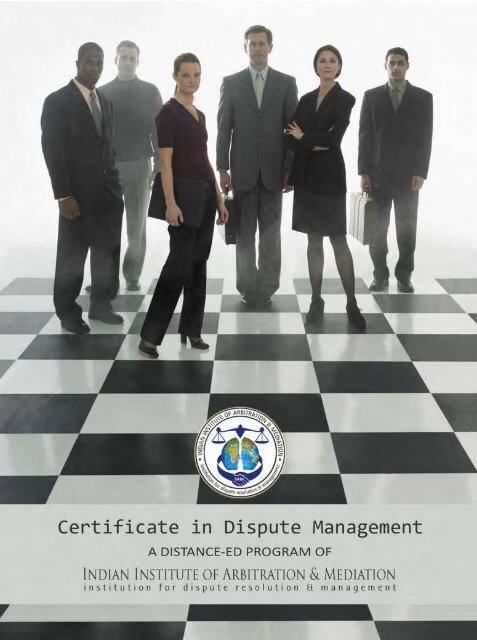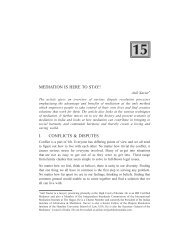Certificate in Dispute Management (Distance-Ed Program) - IIAM
Certificate in Dispute Management (Distance-Ed Program) - IIAM
Certificate in Dispute Management (Distance-Ed Program) - IIAM
- No tags were found...
Create successful ePaper yourself
Turn your PDF publications into a flip-book with our unique Google optimized e-Paper software.
A b o u t t h e C o u r s eCDM is a distance learn<strong>in</strong>g course which willprovide a good basic knowledge of ADR –Negotiation, Mediation & Arbitration. The courseprovides guidance to become an effective negotiatorand a good mediator. The course also givesknowledge on the concept of conciliation andarbitration.Candidates who successfully completethe program will be treated as Grade-C Mediators.They will be deemed to have completed 15 hoursof tra<strong>in</strong><strong>in</strong>g and as per <strong>IIAM</strong> norms they will be empanelled with <strong>IIAM</strong> and will be entitled to mediatecommunity disputes. The normal commercial mediator tra<strong>in</strong><strong>in</strong>g program would be for 40 hours. Aftersuccessful completion, they will be treated as Grade-B Mediators and they will be entitled to mediate alltypes of disputes. Grade-C Mediators who completes 50 hours of community mediation, will be graded asGrade-B Mediators, based on evaluation of the feedback digest and they will be entitled to mediate alltypes of disputes. Grade-B Mediators, who completes 200 hours of mediation, will be entitled to apply forIMI (International Mediation Institute) Certification to be come Grade-A Mediators. IMI Certificationwill be made based on the guidel<strong>in</strong>es issued by IMI.The course is valid for six months from the date of enrolment. Participants can enroll at any time of yearand study entirely at their own pace, submitt<strong>in</strong>g assignments when they are ready. A tutor will beavailable to mark the assignments and give feedback on the progress for a period of six months from thedate of enrolment.The program consists of two modules.Module 1 – Title: Basics on Negotiation & MediationStudy of conventional types of negotiation and the alternatives for pr<strong>in</strong>cipled negotiation and its stagesand method. Styles of negotiation and prepar<strong>in</strong>g to effective negotiation. Overview on mediation basedon evaluative and facilitative methods.Module 2 – Title: <strong>Dispute</strong> <strong>Management</strong> ADR MethodsComparative study of mediation and Conciliation and the methods of mediation. Arbitration and its styleof dispute resolution. Analysis of systems of mediation and arbitration and various laws and rules.Assessment StrategyAssessment is by evaluation of the assignments given at the end of the module.Course materialThere will be four ‘read<strong>in</strong>g and study assignments’ as course materials, andthese form an essential part of the distance learn<strong>in</strong>g course. They are designedto help to work through the course and understand the concepts.CertificationOn successfully complet<strong>in</strong>g the assignments <strong>in</strong>cluded <strong>in</strong> the course thecertificate will be awarded.
AssignmentsEach assignment consists of a problem evaluation and should be no more than 2,500words. Through answer<strong>in</strong>g the assignment the applicant will apply the knowledgega<strong>in</strong>ed through read<strong>in</strong>g, and test the understand<strong>in</strong>g of the concepts.Course feeRs. 10,000/- (USD200 / Euro150) towards tuition fee and Rs. 2000/- (USD45 /Euro35)towards handl<strong>in</strong>g charges outside India. The first part of the course will be sent out onreceipt of the completed application form and payment. The second part will be sentout on completion of the first module.ApplicationThe Admission <strong>in</strong>to the <strong>Distance</strong> <strong>Ed</strong>ucation <strong>Program</strong> is open throughout the year andthe participant can enroll at any time if he meets the eligibility criteria. All professionalsand persons who have undergone basic graduate-level education are eligible forenrolment <strong>in</strong> this program. Law and <strong>Management</strong> students are also eligible to enrollfor this program.To apply for CDM <strong>Distance</strong> education course, complete the course enrolmentapplication form, and submit by post. Applicants are required to submit the completedapplication form, the tuition and handl<strong>in</strong>g fee and all required documentary evidenceconcern<strong>in</strong>g their educational qualifications, date of birth and full name. Payment byDD shall be <strong>in</strong> favour of “Indian Institute of Arbitration & Mediation”. No f<strong>in</strong>al decisionabout an application can be made until this documentation has been received and<strong>in</strong>spected to <strong>IIAM</strong>’s satisfaction.Study by distance learn<strong>in</strong>g is for people who wish toenhance their career prospects and ga<strong>in</strong> aqualification without hav<strong>in</strong>g to attend any timetabledclasses. <strong>Distance</strong>-<strong>Ed</strong> programs offer the facility tostudy <strong>in</strong> a flexible way and fit it around your lifestyle.Try<strong>in</strong>g to get a higher qualification to better yourself,and so improve your talent and employmentpossibilities, can be difficult if you need to attendexpensive classes while try<strong>in</strong>g to keep your job. Thatmight be is the biggest advantage to distanceeducation. It gives you the ability to get yourqualification by work<strong>in</strong>g at your own pace whileputt<strong>in</strong>g <strong>in</strong> the hours you can. <strong>Distance</strong> learn<strong>in</strong>g is alsoan advantage to those who have moved to othercountries for employment reasons and want to betterthemselves but cannot attend regular <strong>in</strong>stitutions orcolleges. The distance education facilities will conductprograms by correspondence, when you send yourwork through the mail, or over the Internet. This is aneasier way to take a distance learn<strong>in</strong>g program asyou’ll have your work marked faster and so cancont<strong>in</strong>ue at a quicker pace.<strong>IIAM</strong> offers <strong>Distance</strong> and Onl<strong>in</strong>e <strong>Ed</strong>ucation programsapproved by <strong>in</strong>ternational standards and guided bydomestic and <strong>in</strong>ternational faculty.Why <strong>Distance</strong>-<strong>Ed</strong>?
About the InstitutionIndian Institute of Arbitration & Mediation (<strong>IIAM</strong>) is one of the pioneer <strong>in</strong>stitutions deal<strong>in</strong>gwith alternative dispute resolution (ADR) services and dispute prevention & management (DPM)services <strong>in</strong> India. Activities of <strong>IIAM</strong> are guided by an Advisory Board comprised of em<strong>in</strong>entjurists and professionals.<strong>IIAM</strong> is the only <strong>in</strong>stitution <strong>in</strong> India approved by theInternational Mediation Institute (IMI), The Hague, as a“Qualify<strong>in</strong>g Assessment <strong>Program</strong>me” (QAP) for IMICertification. This is based on programs whose mediatortra<strong>in</strong><strong>in</strong>g and assessment assertedly provides assurance ofmediation experience and expertise worthy of IMIcertification. IMI is formed for the purpose of certify<strong>in</strong>g<strong>in</strong>ternational standards for mediators and for implement<strong>in</strong>gthe Global Mediator Competency Certification. <strong>IIAM</strong> wasthe International Associate Member of the Civil MediationCouncil UK. <strong>IIAM</strong> also conducts <strong>in</strong>ternational accreditedtra<strong>in</strong><strong>in</strong>g programs <strong>in</strong> negotiation, mediation and arbitration<strong>in</strong> association with <strong>Dispute</strong> Resolution Institute – Haml<strong>in</strong>eUniversity School of Law USA, ADR Chambers UK andCivil Mediation Council UK.More details about the <strong>in</strong>stitution and its activities are available <strong>in</strong> the websitewww.arbitration<strong>in</strong>dia.orgOther <strong>Program</strong>sThere are various <strong>IIAM</strong> tra<strong>in</strong><strong>in</strong>g programs designed to suite theneeds and convenience of participants. It permits them toparticipate <strong>in</strong> a new and excit<strong>in</strong>g dimension of law practice giv<strong>in</strong>ga central role <strong>in</strong> the process of private adjudication and justice.To cater the requirements of various segments of people, <strong>IIAM</strong>conducts tra<strong>in</strong><strong>in</strong>g programs to suite their convenience and need.Tailor-made tra<strong>in</strong><strong>in</strong>g programs on negotiation, mediation orarbitration can be designed to suite the requirement of the<strong>in</strong>dustry or <strong>in</strong>stitution.For further details, see http://www.arbitration<strong>in</strong>dia.com/htm/tra<strong>in</strong><strong>in</strong>g.html or contact <strong>IIAM</strong> Director - dir@arbitration<strong>in</strong>dia.com
Module 1Basics on Negotiation & Mediation (Part 1)Course ContentsModule 1Basics on Negotiation & Mediation (Part 2)OverviewImportance of ADRNEGOTIATIONOverview on NegotiationFUNDAMENTALS ON NEGOTIATIONIntroductionProblems of conventional negotiationsWhat is the alternative?THE METHODSeparate the people from the problemFocus on <strong>in</strong>terests, not positionsInvent options for mutual ga<strong>in</strong>Insist on us<strong>in</strong>g objective criteriaNEGOTIATION STRATEGIESIntroductionFive basic negotiation stylesCorporative versus competitive stylesBeyond style – to effectivenessFOUNDATIONS OF EFFECTIVE NEGOTIATIONIntroductionNegotiation styleAttitudeAuthoritative Standards & NormsLeverageIMPROVING ‘STRATEGIES’Develop<strong>in</strong>g your ‘BATNA’The better your BATNA, the greater your powerConsider other side’s BATNAMak<strong>in</strong>g to participateNegotiation JujitsuConsider the one-text procedureTAMING THE HARD BARGAINERHow to negotiate about the rules of the game?Some common tricky tacticsETHICS IN NEGOTIATIONThe m<strong>in</strong>imum standard – Obey the LawBeyond the Law –A look at EthicsMEDIATIONOverview on MediationHow does it work?What is Mediation?Key qualities of Mediation ProcessAdvantagesTHE ART & SCIENCE OF MEDIATIONSome key ADR dist<strong>in</strong>ctionsMediation Def<strong>in</strong>edTHE METHODMediators & their approachesPRINCIPLES OF CONFLICT MANAGEMENTThe Five P’s of Conflict <strong>Management</strong>STAGES OF MEDIATIONInitiation of the Mediation ProcessMediation SessionPost SessionTHE MEDIATORS JOBJob description of a MediatorJob qualification of a MediatorMediators QualitiesAssess your po<strong>in</strong>t of entryCommitBADGERBeg<strong>in</strong> the DiscussionAccumulate InformationDevelop the Agenda & Discussion StrategiesGenerate MovementEscape to Separate SessionsResolve the <strong>Dispute</strong>MEDIATORS TECHNIQUESNegotiation techniques used by a MediatorFORMS OF AGREEMENTWritten AgreementsNo Written AgreementsPRE-REQUISITE FOR SUCCESS OF MEDIATIONJoy of Mediat<strong>in</strong>gETHICAL DILEMMAS & PRACTICAL CHALLENGESCode of Conduct for MediatorsThe right measure of Ethics – Just enough
Module 2<strong>Dispute</strong> <strong>Management</strong> ADR Methods (Part 1)Course ContentsModule 2<strong>Dispute</strong> <strong>Management</strong> ADR Methods (Part 2)CONCILIATIONOverview & Def<strong>in</strong>ition of ConciliationVARIETIES OF CONCILIATIONCharacteristics of ConciliationWHO IS A CONCILIATOR?Qualities & Duites of a ConciliatorContribution & Role of ConciliatorRestrictions on role of ConciliatorDISPUTES SUITABLE FOR CONCILIATIONHow can resource to Conciliation be sought?MEDIATION & CONCILIATIONSimilarity between Mediation & ConciliationDifference between Conciliation & Mediation underIndian LawAdvantages & DisadvantagesPRINCIPLE STEPS IN MEDIATION THROUGHMEDIATION CENTREStages <strong>in</strong> a Structured Mediation ProcessPr<strong>in</strong>ciples of procedure of ConciliationTerm<strong>in</strong>ation of Conciliation Proceed<strong>in</strong>gsSimilarity between Arbitration & ConciliationBRIDGING THE DIVIDE BETWEEN LAWYERS &MEDIATORSWhat Mediators can do for Lawyers?CONCILIATION UNDER THE ARBITRATION &CONCILIATION ACT OF 1996Conciliation Proceed<strong>in</strong>gsRole of Conciliator <strong>in</strong> Conciliation Proceed<strong>in</strong>gsTerm<strong>in</strong>ation of Conciliation Proceed<strong>in</strong>gsTHE CODE OF CIVIL PROCEDURE (AMENDMENT) ACT,1999Settlement of <strong>Dispute</strong>s outside the CourtCONSULTATION PAPER ON ADR & MEDIATION RULESDraft Alternative <strong>Dispute</strong> Resolution & MediationRules 2003IMPORTANCE OF ADRInstitutional ADR<strong>IIAM</strong> MEDIATION RULESONLINE DISPUTE RESOLUTIONIntroductionOnl<strong>in</strong>e <strong>Dispute</strong> Resolution: An OverviewArbitration ProvidersChoice of systemBenefits & Challenges of ODRTechnology as the Fourth PartyEVOLUTION OF ARBITRATION LAW IN INDIAEvolution of law relat<strong>in</strong>g to arbitration <strong>in</strong> IndiaThe Arbitration Act 1940The Arbitration & Conciliation Act 1996DEFINITION & MEANING OF ARBITRATIONAdm<strong>in</strong>istered ArbitrationArbitrable <strong>Dispute</strong>sDef<strong>in</strong>ition of Arbitration AgreementArbitration clauses <strong>in</strong> contractsWritten arbitration agreementAdvantages of ArbitrationAPPOINTMENT OF ARBITRATORProcedure for appo<strong>in</strong>tment of ArbitratorsChallenge and Removal of ArbitratorsDeterm<strong>in</strong>ation of the Tribunal’s competenceARBITRAL AWARDDeterm<strong>in</strong>ation of law applicable to arbitralproceed<strong>in</strong>gsMak<strong>in</strong>g of an AwardDef<strong>in</strong>ition & K<strong>in</strong>ds of AwardCorrection & Intepretation of AwardAdditional AwardEffect of f<strong>in</strong>al Arbitral awardSALIENT FEATURES OF THE ARBITRATION &CONCILIATION ACT 1996INTERNATIONAL COMMERCIAL ARBITRATIONUse of Arbitration <strong>in</strong> Settlement of InternationalCommercial <strong>Dispute</strong>sFOREIGN AWARDSINTERNATIONAL COMMERCIAL ARBITRATIONCOMPARISON WITH ARBITRATION LAWS OF SAARCCOUNTRIESINSTITUTIONAL ARBITRATIONINTERNATIONAL BAR ASSOCIATION ETHICS FORINTERNATIONAL ARBITRATORS
Application FormName:Affix your passport sizephotograph hereDate of Birth: Male: Female:Address for correspondence:<strong>Certificate</strong> <strong>in</strong> <strong>Dispute</strong> <strong>Management</strong>DISTANCE-ED PROGRAMTelephones:Mobile:Email:Academic qualifications: (Please mention the highest qualification)Exam<strong>in</strong>ation passed College/School/University Year Divison / Comments(To be filled by work<strong>in</strong>g professionals only)Designation:Name of Organisation:Experience (<strong>in</strong> years):Payment by: Cheque Demand Draft PayPalNo.:Bank:Date:Branch:Signature:♦ No column should be left blank♦ All entries to be made <strong>in</strong> block letters♦ Attach self-attested photocopy of highest qualification♦ Attach a brief Statement of Purpose <strong>in</strong>dicat<strong>in</strong>g your <strong>in</strong>terest <strong>in</strong> <strong>Dispute</strong> <strong>Management</strong>♦ Fees: Rs. 10,000/- (USD 200 / Euro 150) towards tuition fee and Rs. 2000/- (USD 45 / Euro 35) towards handl<strong>in</strong>gcharges outside India.
Application FormDECLARATION BY APPLICANTI here by declare that:<strong>Certificate</strong> <strong>in</strong> <strong>Dispute</strong> <strong>Management</strong>DISTANCE-ED PROGRAMI have read and understood the eligibility conditions for enrolment <strong>in</strong> the <strong>Certificate</strong> <strong>in</strong> <strong>Dispute</strong><strong>Management</strong> (CDM) & I fulfill the m<strong>in</strong>imum eligibility criteria and I have provided necessary<strong>in</strong>formation <strong>in</strong> this regard. In the event of any <strong>in</strong>correct or mislead<strong>in</strong>g <strong>in</strong>formation, mycandidature shall be liable for cancellation at any time and I shall not be entitled to any claimfor readmission/reimbursement/certification.I also understand that:No employment or recruitment is guaranteed by <strong>IIAM</strong> pursuant to completion of this program.No representation as regards affiliation of the program from any university or governmenteducational <strong>in</strong>stitute is made.<strong>IIAM</strong> reserves the right to change the rules & regulations from time to time <strong>in</strong> its sole andabsolute discretion. If any such change is made, the latest amended rule/regulation would beapplicable.The enrolment <strong>in</strong> CDM program is subject to the realization of program fee.The fee paid by me for the program is non-refundable, non-transferable under anycircumstances whatsoever. Jurisdiction for all matters shall be Ernakulam, Kerala.Date:Signature:Applications complete <strong>in</strong> all respects should be sent to:Indian Institute of Arbitration & MediationG-254, Panampilly Nagar, Coch<strong>in</strong> 682 036Kerala, INDIA.Tel: 0484 4017731 | 6570101For office use onlyApplication received on:Enrolment number allotted::First Module assignement submitted on:Second Module assignment submitted on:<strong>Certificate</strong> issued on:



